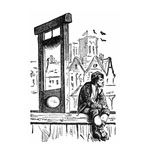
Pope Benedict’s Surprise
LET THEM COME TO ST. RADEGUND
George Weigel has said that Pope Benedict XVI has been full of surprises. Just before Benedict arrived in the United States in April 2008, another observer, Fr. Raymond DeSouza, wondered whether Benedict would say or do anything that would surprise us as much as several other apparent “mistakes” he had made during his three-year papacy. Fr. DeSouza’s list of “mistakes” or “surprises” did not include the decree Benedict issued on June 1, 2007. This decree was indeed a surprise, and it is equally surprising that, in the ensuing year-plus, there has been precious little analysis of the import of this decree in light of world events.
On June 1, 2007, Benedict declared that Franz Jagerstatter had been a martyr for the Catholic faith. It was one of several papal actions on June 1 announced in a June 3, 2007, Vatican press release. The announcement simply stated that Jagerstatter was “an Austrian peasant who was guillotined in Berlin in 1943 for having refused any collaboration with the Nazis. He was 36, a husband and a father of three.”
Taken at face value, this decree appeared to be just another routine example of a pope making a ruling concerning the beatification or canonization of a Catholic. Outside observers might ask: Wasn’t Jagerstatter just another man among the millions killed during the Nazi era? Wasn’t it obvious to Jagerstatter’s contemporaries who had half a brain that the war the Nazis waged was grievously wrong? No and no.
Benedict’s decree allowed Jagerstatter, a native of St. Radegund, Austria, to be declared a “blessed,” one step short of a canonized saint. He was declared blessed in a ceremony on October 26, 2007. It was surrounding this event in October — not the decree in June — that some short biographical sketches of Franz appeared in the Catholic and secular press. Franz was clearly a devout Catholic — he was a sacristan who attended daily Mass — but no sketch answered the question of why his refusal to collaborate with the Nazis was a distinctively Catholic thing to do, meriting the appellation “martyr” for the Catholic faith. After all, the Nazis did not generally arrest or execute Catholics. Indeed, Franz himself was not arrested until he presented himself to military authorities, as he was ordered to do, and refused service.
You May Also Enjoy
Bishop Mulvee hopes that Benedict XVI will "unite the entire church."
The problem of two different conceptions of a cleric-as-minister and a cleric-as-priest divided Christendom and has seeped into the Church.
Ratzinger was keenly aware of the ways the Mass has been trivialized and made to appear as an ongoing and evolving experiment.

